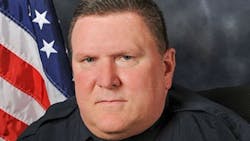Former MLB Player-Turned San Diego Police Officer Dies of Complications From Line of Duty Shooting
By John Maffei, The San Diego Union-Tribune
Source The San Diego Union-Tribune
SAN DIEGO -- Dan Walters, who appeared in 84 games for the Padres in 1992 and '93, died Thursday from ongoing complications related to an injury he suffered in the line of duty while he was a San Diego police officer.
Walters, who played at Santana High, was 53. His death is considered a line-of-duty fatality.
A San Diego Police Department dispatcher came over the police radio to announce Walters' death, or "end of watch."
"Dan grew up locally, played professional baseball here in San Diego and proudly served his city as a police officer," SDPD said in a statement. "He will forever be remembered by the members of this Department."
A video posted by the San Diego Police Department on Thursday afternoon showed two officers standing over Walters, his body and bed draped in a large American flag.
As officers moved Walters' still flag-covered body outside on a gurney, a large group from the police department, including Chief David Nisleit, stood at attention in the driveway.
Eight motorcycle officers and three SUVs escorted a van carrying Walters' body.
Walters joined the police department in 1998, two years after his baseball career ended when he suffered a severe spinal injury diving for a ball during a spring training drill in Arizona.
"Tragic story with Dan," said Bruce Bochy, a coach with the Padres when Walters played and later a manager for the Padres and San Francisco Giants. "Terrific person who was a great teammate. Could really catch and throw. He had some pop in his bat.
"This is a sad story of a man who was serving his community as a policeman."
Walters hit .234 with five homers and 32 RBI in his two major-league seasons, while backing up Benito Santiago in 1992 and sharing catching duties with Brad Ausmus and Bob Geren in '93.
He was drafted in the fifth round by the Houston Astros in 1984 and was traded to the Padres in 1989.
He later played in the Colorado Rockies and Oakland A's organizations, but never made it back to the major leagues.
In a 1999 interview with the Union-Tribune, Walters said becoming a policeman was "something I have had in the back of my mind, even while playing. I have a cousin who has been a cop in Houston for the past 15 years. He got me interested."
On Nov. 12, 2003, five years into his new profession, he was on patrol on 43rd Street in southeast San Diego when he came across officers who were responding to a domestic violence dispute.
When Walters arrived on the scene, shots had already been fired. He exited his patrol car and was immediately confronted by the suspect. As the two struggled, Walters was shot in the neck.
"I heard a bang," Walters told the Union-Tribune in 2013, "and I'm falling to the ground, looking up at this guy, thinking, 'Oh, God! I can't believe it: I'm dead.' I felt nothing. I was looking straight up and I again thought: 'I can't believe I'm dead. Then, it all went black.' "
After being shot, Walters was struck by a passing motorist and suffered two crushed cervical vertebrae.
The suspect was killed by officers. Walters was left paralyzed and remained in a wheelchair until the time of his death.
In the 2013 interview, he said: "It's hard to believe it's been 10 years. I didn't expect to be around this long."
Asked if he relived the incident at all, Walters said, "Unfortunately, throughout the day. Every day. Some days a lot worse than others."
Dr. Steve Albrecht, one of Walters' closest friends, said the two men were workout partners in El Cajon in 1996, before Walters became a policeman.
"I loved him dearly," Albrecht said. "He came on the PD with two steel rods in his spine from his baseball injury. He chose to start a tough job that causes most people to retire. It's so sad and ironic that he made his living with his body, as a pro ball player and a cop, to then get paralyzed.
"He was in so much physical and emotional pain from his shooting injury. He lived through so many serious infections, had to take so many medications, had mostly crappy medical care from a string of caregivers in his house. I know that he is no longer in pain.
Albrecht said Walters was a "hell of a motivational speaker, even though he was too proud to admit he had that talent. His best friend on the PD was Chris Wilson, who was killed on duty (in 2010).
"He spoke at Chris' funeral and you could have heard a pin drop."
Walters was adopted and both his parents have died. He's survived by his sister, Trisha Turner.
"I'll remember my pal Honcho, his smile, his love of baseball and watching a ball game and eating pizza, at his house, his two cats sitting on his lap," Albrecht said.
Staff writers David Hernandez and Alex Riggins contributed to this report.
Updates:4:50 PM, Apr. 23, 2020: This article was updated with additional information including a video from SDPD.
———
©2020 The San Diego Union-Tribune
Visit The San Diego Union-Tribune at www.sandiegouniontribune.com
Distributed by Tribune Content Agency, LLC.



